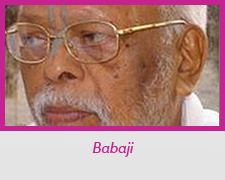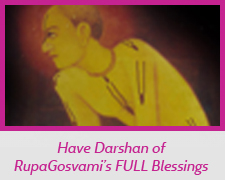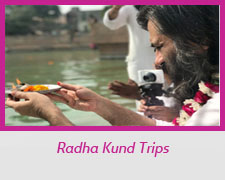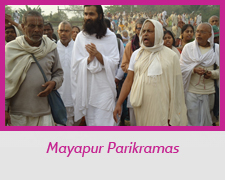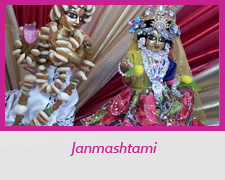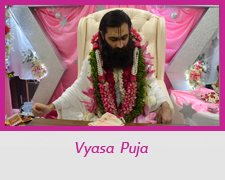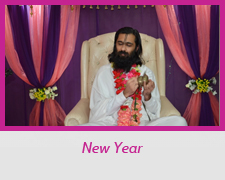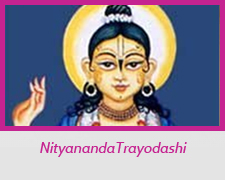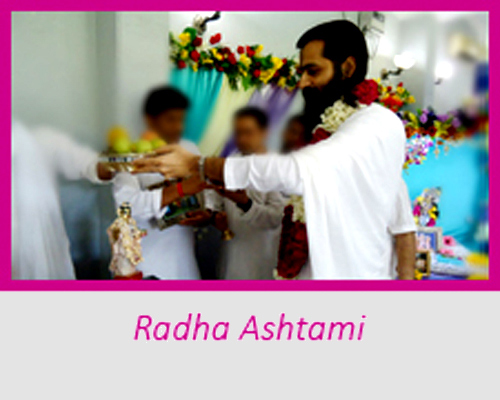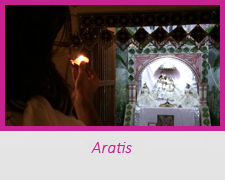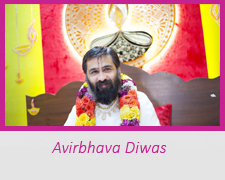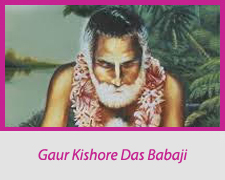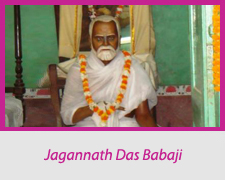After dékñä, can we decide what relationship we want with Kåñëa?!?
Question - MAHÄRÄJA JÉ, Mädhavi Gauré Idäsé from Iskcon Melbourne is asking- In Våndävana is our svarüpa decided or can we decide our relationship with Kåñëa?
MAHÄRÄJA JÉ – Well, this question seems to be filled with innocence but actually it is filled with ignorance. It is not an innocence- filled question, it is an ignorance- filled question. Why is it so?
You are saying that can we choose our relationship with Kåñëa. First of all, all devotees must understand that relationship is not chosen, it is being bestowed. Relationship is being bestowed by the Sampradäya. If you are connected to Puñöi Sampradäya, then obviously, you are going to have vätsalya for Kåñëa. Relationship is not chosen.
First of all, understand this. No Sampradäya is a supermarket of all bhävas, that you can choose out of the following. You go to a mall, you choose anything which we want from the mall, and get back home.
Well, Sampradäya, spiritual life is not like that. We are not here to choose, we get the bhäva of the Sampradäya, and you do sädhnä and then, we get Siddhi. You are asking– Can we choose our relationship with Kåñëa?
Well, if you are not initiated and you are just starting spiritual life, and you are a completely ignorant materialistic person. Then the answer is yes, you can choose. But once you are connected to a Sampradäya…Be very clear, in a Sampradäya, at the time of initiation only, your relationship with the Lord, is given to you, that you have this particular relationship with the Lord.
You go to Nimbärké Sampradäya, they tell you very clearly that we are däsés of Rädhä and Kåñëa. Plain and simple. No if’s and but’s… Lekin, kintu, parantu, why this, that. No, nothing!
You go to any Räma Sampradäya, they will say– Yeah, I am däsa of Lord Räma.
You go to Haridäsé Sampradäya, they will say, we are däsés of Rädhä Kåñëa.
Similarly, leave aside Iskcon-Gauòéya maöha, you go to entire Gauòéya Vaiñëava Sampradäya, they will clearly say – We are däsé of Rädhä Kåñëa. There are no ifs and buts about it.
First of all, understand the meaning of Sampradäya.. that, Sampradäya bestows only one bhäva. Go to any Sampradäya, at any yuga, you will see all Sampradäyas, they bestow only one bhäva. This is the meaning of Sampradäya – ‘samyak pradäyate iti sampradäya’.
One Sampradäya means which gives exactly what is being given to them, from the very starting. It’s not that you chose out of the blue, and say – “I want this, I don’t want that!” And another thing, there is ignorance in this question.
anarpita-caréà cirät karuëayävatérëaù kalau
samarpayitum unnatojjvala-rasäà sva-bhakti-çriyam
hariù puraöa-sundara-dyuti-kadamba-sandépitaù
sadä hådaya-kandare sphuratu vaù çacé-nandanaù
(Vidagdha Mädhava 1.2)
Çréla Rüpa Gosvämé tells that Mahäprabhu is giving that rasa which was not bestowed earlier. Well, sakhya rasa was there earlier, däsya rasa was there earlier, vätsalya? Of course, that was there earlier and even gopé bhäva was there earlier, Vidyäpati, Caëòédäsa, all of them were doing sädhana in gopi bhäva, so all of the bhävas were there earlier, then which is the bhäva which was not given earlier? It was servitude to Rädhä and Kåñëa as their däsé. This bhäva was not there earlier.
So, if your question is – can I choose? That means you don’t understand what Mahäprabhu has come to give, to all of us, to all Gauòéya Vaiñëavas! He has come here to give us Rädhä Kåñëa’s sevä. In Särvabhauma Çataka, Çréla Särvabhauma Bhattäcärya, He tells very clearly in Verse 2,
çré-rädhä-kåñëayoù seväà sthäpayitvä gåhe gåhe
çrémat-saìkértane gauro nåtyati prema-vihvalaù
Mahäprabhu introduces the loving devotional service of Rädhä Kåñëa in each and every home, then, why are you questioning– ‘Which relationship should I choose?’ Are you not a Gauòéya Vaiñëava? If you are, then there is no point asking this question. Because if you are asking this question, first of all, you don’t know the meaning of a Sampradäya, and then you don’t know what Gauòéya Vaiñëava Sampradäya is. That is why, I said in the beginning, the question is filled with ignorance.
And, you can see in this Caitanya Candrämåta, by Prabodhänanda Sarasvaté, this is Verse 112 –
stré-puträdi-kathäà jahur viñayiëaù çästra-pravädaà budhä
yogéndrä vijahur marun-niyama-ja-kleçaà tapas täpasäù
jïänäbhyäsa-vidhià jahuç ca yatayaç caitanya-candre paräm
äviñkurvati bhakti-yoga-padavéà naivänya äséd rasaù
When Mahäprabhu came here, and He preached & He gave love of Godhead to everyone. It seems that no other rasa remained on the planet except service to Rädhä and Kåñëa.
naivänya äséd rasaù.
These are the last concluding words of this Verse. naivänya äséd rasaù… na eva anya.. ‘anya rasa’ other than service to Rädhä Kåñëa, they all seemed to have evaporated. Only service to Rädhä Kåñëa completely took the entire planet earth, that everyone was ecstatic serving Rädhä & Kåñëa. And Gauòéya Vaiñëava Sampradäya means follower of Lord Gauräìga. And if Mahäprabhu has given service for Rädhä Kåñëa, then, Gauòéya Vaiñëava Sampradäya, will it give something else? Use some common sense! Plus, I am giving you answer from so many different angles, that first of all understand, meaning of Sampradäya, then understand the meaning of Gauòéya Vaiñëava Sampradäya. Then I’m giving you another way of understanding this thing, ‘anarpita-caréà cirät’, what Mahäprabhu came to give. Now I am telling you that no other Rasa remained.
Now, I am giving you another way to understand – If you are asking this question even after chanting Hare Kåñëa for so many years, that I don’t know what relationship I have with the Lord, then very sorry to say, you are not in Gauòéya Vaisanav Sampradäya. You belong, you are associated with some cult! Some group.. but not a Gauòéya Vaiñëava.
You ask any Gauòéya Vaiñëava, other than Iskcon and Guaòiya maöha, they’ll say very clearly, just like Nimbärkis, when you ask them what is your relationship with the Lord? They’ll say – “Rädhä-Kåñëa are my Lord and I am Their däsé.”
Same with nimbärkis, same with Rädhä Vallabhas, same with Haridäsés. And same with all Gauòéya Vaiñëavas, except Iskcon & Gauòéya maöha.
Gauòéya Vaiñëava Sampradäya is very plain & simple, we are däsa of Lord Gauräìga in Nitya Navadvépa eternally, and däsé of Rädhä Kåñëa in Vraja eternally!
All our Gosvämé Granthas are written just to serve Rädhä Kåñëa. There are no grantha of sakhya rasa written by any of our Gosvämés. You read so many añöakams like Rädhä kuëòa añöakam, Kåñëa añöakam, Rädhikä añöakam, Lalitä añöakam, phala çruti is the same – May you get love of Rädhä Kåñëa by hearing and chanting about these stutis.
Why does this question come up? You sing Tulasi äraté everyday in the morning and in the evening as well…
çré rädhä govinda preme sadä jena bhäsi,
namo namaù tulasi kåñëa preyäsé…
May I always float in love for Rädhä & Govinda. You are yourself doing Tulasi äraté in the morning and evening, yet you are asking this question, which relationship should I have?
If anyone has this question, I’m very humbly telling them, they don’t know the meaning of Sampradäya, they don’t know what Gauòéya Vaiñëava Sampradäya is, they don’t know what Mahäprabhu has come here to give to all of us. You are doing everything mechanically, whether it is Tulasé äraté, or it is Maìgala äraté, you don’t know what your relationship with the Lord is. In any yuga, any Sampradäya, have you seen any devotee doing daily maìgala äraté of the Lord and doesn’t even know his relationship with the Lord, have you ever heard about this horror comedy!! I mean, you don’t know your relationship with the Lord, you’re attending a general maìgala äraté?
“There are so many Lords, Jagannätha Baladeva Subhadrä is there, Sétä Räma is there, Narasiàha Bhagaväna is there, I’m attending a common Maìgala äraté!”
Anyone who attends maìgala äraté of his Éñöa Deva, gets siddhi. If he attends maìgala äraté only of his Éñöa Deva, not of so many forms of God at the same time! This is totally not required. That is why I’m telling you, if you have this question ‘I don’t know, can I have any relationship?’ Why do you want to have any relationship with Kåñëa? You don’t know what Sampradäya is? At least have some basic understanding of spiritual life.
Mahäprabhu has come here to give which was not bestowed earlier. This Caitanya Candrämåta Verse 3 tells,
yan näptaà karma-niñöhair na ca samadhigataà yat tapodhyäna-yogair
vairägyais tyäga-tattva-stutibhir api na yat tarkitaà cäpi kaiçcit
govinda-prema-bhäjäm api na ca kalitaà yad rahasyaà svayaà tan
nämnaiva präduräséd avatarati pare yatra taà naumi gauram
govinda-prema-bhäjäm api na ca kalitaà, He is giving that which govinda-prema-bhäjäm api na ca kalitaà ‘ – Devotees filled with love for Lord Kåñëa, which they never get, Mahäprabhu is giving them that! Mahäprabhu is giving all the Gauòéya Vaiñëavas that form of love which even devotees of Lord Kåñëa, they don’t get.
He’s not giving love of Kåñëa, Mahäprabhu is giving love for Rädhä & Kåñëa. We are not worshippers of Kåñëa alone, we are worshippers of Rädhä & Kåñëa. That is why, Prabodhänanda Sarasvaté is saying ‘govinda prema bhäjäm api’ even one is filled with love for Lord Kåñëa but Mahäprabhu is not giving that. He is giving something which was not given earlier, even by Lord Kåñëa Himself.
There is a Verse 18 of Caitanya Candrämåta. You can see this powerful grantha. It’s Caitanya Candrämåta, Verse 18, it is telling that Mahäprabhu is giving that path of bhakti which even Çukadeva Gosvämé did not know.
Kindly open your eyes and ears again.
Çukadeva Gosvämé did not know the path of bhakti which Mahäprabhu is giving. The word ‘Rädhä’ is not mentioned directly in Çrémad Bhägavatam and Mahäprabhu is giving the bhakti of Rädhä. That Rädhä whose name was not mentioned.. that Rädhä & Kåñëa! And He is telling in this verse only that even Lord Kåñëa did not give this rasa earlier. Only Mahäprabhu, Kåñëa as Mahäprabhu, is giving the service of Rädhä & Kåñëa now. It was not bestowed earlier. And still, you are asking this question, can I choose any relationship with the Lord? This question is filled with tons of ignorance. I hope this answer will give clarity to all of you.


